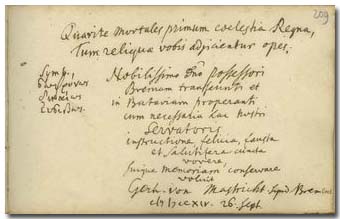
Quaerite mortales primum coelestia Regna,
Tum reliquae vobis adjicientur opes. *

Nobilissimo D[omi]no Possessori Bremum transeunti et in Bataviam
properanti cum necessaria hac nostri Servatoris instructione,
felicia, fausta et salutifera cuncta vovere, suique memoriam
conservare voluit
Gerh[ard] von Mastricht, Synd[icus] Bremens[is]

|
* The Latin verses are a paraphrase in
distich of Lk 12:31. The original is: “verumtamen quaerite regnum
Dei et haec omnia adicientur vobis” / “But rather seek ye the
kingdom of God; and all these things shall be added unto you”. *
The source of the Greek motto is Tit 2:12:

Vulgate: “sobrie et iuste et pie vivamus in hoc saeculo” /
“we should live soberly, righteously and godly in this present
world”.
|
|
|
Seek, you mortals, first of all the realm of the heavens / and
then all the other riches will be also added unto you. *
Motto: “Soberly, righteously and godly.” *
With this teaching of our Saviour I want to
wish everything best, prosperous and salutiferous to the noble
possessor [of this album], who on his journey to the Netherlands
touches Bremen
Gerhard von Mastricht councillor in Bremen
on September 26, 1714.
|
p.
209. Bremen, September 26, 1714
Mastricht, Gerhard von
(1639-1721), German Reformed
theologian, historian of law
Gerhard von Mastricht was born on September 26, 1639 in Cologne, a
son of the local Reformed pastor Thomas von Mastricht and of
Johanna de Plancq. On his mother's side he was the grandson of the
Mayor of Ath; his brother was the theologian Petrus van Mastricht
(1630-1706). His father's family fled from anti-Protestant
persecutions in Maastricht to Cologne; their original family name
's-Coning was already changed by his grandfather Cornelius.
Gerhard may have studied in Leiden, then he graduated both in
Roman and canon law ((J.U.D. = juris utriusque doctor, doctor of
both laws) in 1665 in Basel. From 1669 he was a professor of
law and history in Duisburg. In 1688 he was appointed councillor
(syndicus) in the magistrate of Bremen. He also received foreign
appointments, where he represented the interests of the city with
great talent. His scholarly activity embraced canon law, history
of law and theology. Several of his works were on the Roman Index.
After the early death of his son Peter he sold his valuable
library at an auction, but he published its catalogue with his
annotations on the single books (Bremen 1719). He also died a few
years after this, on January 22, 1721. His most important works,
including his beautiful New Testament:
Disputatio iuridica inauguralis de adulteriis. Basel, 1665. -
De Venere damnata. – Historia juris ecclesiastici et
pontificii … Duisburg, 1676. Amstelod. 1686, Hal. 1705, 1719
(also in Opera Ant. Augustini, Lucae t. III). – Ant. Augustini
de emendatione Gratiani [Dialogorum] libri duo. Gerh. von
Mastricht jc. edidit … In fine addita est oratio Andr. Schotti
de vita et scriptis auctoris. Duisburg, 1676. – Moysis Amyraldi
De jure naturae, quod conubia dirigit, disquisitiones sex …
Halle, 1712. – He kaine diatheke = Novum testamentum
post priores Steph. Curcellaei, tum et DD. Oxoniensium labores
… ad XLIII. Canones examinat G. D. T. M. D. (= Gerardus de
Trajectu Mosae Doctor). Amsterdam, 1711. – Catalogus
bibliothecae Gerh. v. Mastricht, syndici Bremensis, librorum, in
quavis facultate insignium, item manuscriptorum aliquot rariorum.
Qui auctione distrahentur Bremae den 25. Septemb. 1719. Bremen,
1719.
•
ADB • Jöcher • Jöcher-Adelung |